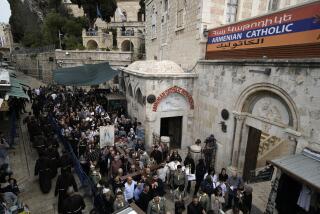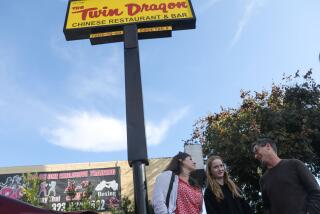Coptic Christians in Los Angeles voice cautious optimism for Egypt’s future
- Share via
As news spread Friday that Egyptian President Hosni Mubarak had resigned, members of California’s Coptic Christian community shared a sense of joy and relief with family and friends, many of whom had stood alongside their Muslim neighbors in Cairo and Alexandria during 18 days of pro-democracy protests.
“I just burst into tears. I was so overjoyed, so proud,” said Susanna Khalil, 27, an attorney in Santa Monica. Khalil’s mother immigrated to the United States from Cairo in 1975 and her father, who died in 1987, served in the Egyptian air force with Mubarak.
Khalil was thrilled by the news, but said her mother and aunts still worry about the weeks ahead and how they will affect Copts, Egypt’s largest religious minority. “There is always a risk,” she said. “But it gives me hope that the voice of the people is louder than the voice of tyranny. It gives me hope for Christians.”
At St. Mark Coptic Orthodox Church in West Los Angeles, where Khalil was baptized, senior cleric Father Bishoy Gobreial, 82, responded to Friday’s news with prayer.
“I feel that everything is going to be quieter now. I hope the new regime will succeed in keeping things calm. I hope the Lord will take care of our Church,” Gobreial said.
The Coptic Church dates to the time of the Apostles, according to church tradition.
Copts, who make up about 10% to 12% of Egypt’s population of more than 80 million, have faced discrimination and rising attacks there in recent years, including a suicide bombing in the northern city of Alexandria last month that killed 24 worshipers and injured scores of others outside a church.
But members of Los Angeles’ Coptic community expressed cautious optimism Friday that the popular uprising and military takeover that swept Mubarak from power may bring positive change for Egypt’s religious minorities, including Copts.
They pointed to encouraging signs, including the scene this week of Egyptian Muslims and Christians praying alongside one another in Cairo’s Tahrir Square.
“What has happened in Egypt has united not only Copts and Muslims but everyone,” said Father Raphael Hanna, another priest at St. Mark. “We are united against unfair rule and suffering. Suffering doesn’t differentiate between religions.”
Hanna, Gobreial and several St. Mark congregants said they were speaking as individuals, and not for the Coptic Church. Yet their feelings were clear. Those interviewed said their hope that a post-Mubarak government will grant broader religious freedom to minority communities in Egypt is greater than their fear that it could empower Islamist fundamentalists.
Since the late 1960s, tensions have grown between Egypt’s Muslim and Coptic communities. Some analysts have suggested the Mubarak regime has deliberately fomented sectarian strife to stoke fears of Islamist extremism and justify emergency powers and repressive measures.
“At best they turn a blind eye, at worst they are involved,” Khalil, the Los Angeles lawyer, said of the former regime’s alleged complicity in attacks against Christians.
In recent weeks, as the protests in Egypt continued, Copts have joined Muslim Egyptians in solidarity rallies in Los Angeles. Coptic community members declared a three-day period of prayer and fasting in solidarity one week after the protests began. And on Feb. 27 there will be a prayer day at the Los Angeles Convention Center to honor the memory of 60 Copts who have died in violence in Egypt in the last 10 years.
In Cairo’s Tahrir Square last week, Copts and Muslims stood together and protected one another while they prayed. But now that the common goal of Mubarak’s ouster has been achieved, some Egyptian Christians here fear that divisions could reappear as groups vie for power.
“History tells us that things can change in a crisis. But only the long term will show whether there will be a true improvement between Christians and Muslims in Egypt,” said an engineer from Culver City, who asked that his name be withheld to protect his family in Alexandria.
“Egypt is a very religious country. Whether things improve for Christians depends on the positions the Muslim clerics take,” he said.
“The big question is ‘What is the next step?’ That is not yet clear,” said Hanna, from St. Mark.
Added Gobreial, his fellow priest: “We are in the hands of God. The Lord will take care of the Church. We do not have any fear.”
More to Read
Sign up for Essential California
The most important California stories and recommendations in your inbox every morning.
You may occasionally receive promotional content from the Los Angeles Times.













